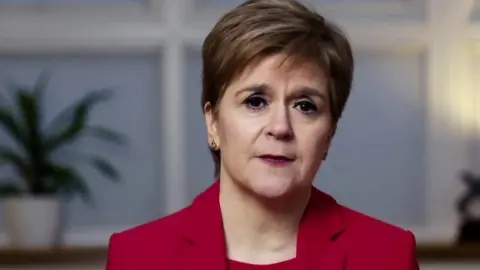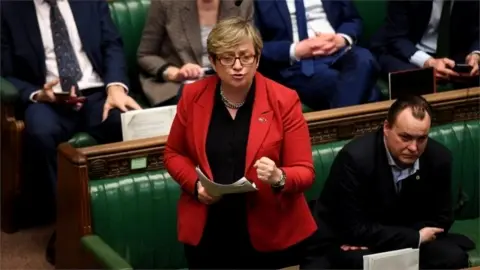SNP internal election results may cause problems for Nicola Sturgeon
 BBC
BBCThere was no applause, no cheering and no standing ovation for Nicola Sturgeon's address to the SNP.
That's how politics is in this pandemic, with speeches delivered to online audiences rather than in crowded rooms.
The trouble, for observers like me, is that you cannot judge the mood of party members from watching a virtual conference.
It may be that most are reasonably content but clearly some are not.
There has been criticism of the leadership's approach to independence from high-profile figures such as MPs Joanna Cherry and Angus MacNeil.
They want Nicola Sturgeon to adopt alternative plans for securing independence if Boris Johnson refuses to agree another referendum after May's Holyrood election.
Former cabinet minister Alex Neil wants a judge-led inquiry into how complaints against Alex Salmond were handled.
Together Mr Neil and Mr Salmond have issued a five-point action plan for economic recovery from the Covid crisis.
Former justice secretary Kenny MacAskill is among those to have raised concerns about the internal workings of the SNP.
A vocal minority? Or representatives of a wider mood for change?
'United and determined'
On Thursday, Nicola Sturgeon told me the SNP was a "pretty united and determined and focused bunch of people" whatever social media might suggest.
Today - the results of internal party elections record success for a determined effort by those promoting change in the SNP.
The left-leaning Common Weal group has secured 11 seats on the party's ruling body - the national executive committee (NEC) - in internal party elections.
The successful candidates, including MPs Joanna Cherry and Douglas Chapman, have pledged to push for a new independence campaign, reform of SNP complaint handling and a bigger voice for grassroots members.
 UK Parliament
UK ParliamentThree groupings - Common Weal, SNP Good Guys and Women's Pledge - have won combined majorities on the SNP's policy, conference and member conduct committees.
The conduct committee now includes MP Neale Hanvey (associated with all three groups) who was readmitted to the SNP after apologising for sharing anti-Semitic material on social media.
Good Guy candidates called for greater transparency in how the SNP does business and a stronger focus on independence.
Women's pledge candidates oppose reforms to the Gender Recognition Act, that would make it easier for people to legally change gender.
Their block of successful candidates includes Caroline McAllister and Lynne Anderson who won the key women's and equalities convenor posts on the NEC.
The MP Alyn Smith - a strong supporter of Gender Recognition Act reform, lost his position as policy development convenor to Chris Hanlon, who is relatively unknown.
Ms Cherry has hailed the results as a "clear mandate for change in the SNP" and urged the party leadership to listen.
A significant shift
MP Kirsty Blackman suggested the election outcome could enable "the massively successful SNP leadership to be undermined by a small group".
MP Pete Wishart, who had warned against factionalism, urged party members "to try and make this work. Tides come in, then they recede" he said.
In other notable changes, cabinet minister Mike Russell - who is standing down from Holyrood - has been elected to the honorary position of president of the SNP.
Former minister, Stewart Stevenson, who is also leaving parliament, is the SNP's new national secretary.
But the most striking thing about these internal SNP elections is that the party's ruling body now contains a significant block of members who are critical of the current leadership.
That is democracy (on a low turnout as it happens) but it is also a significant shift in a party that has built its success on internal discipline.
There may be trouble ahead for Nicola Sturgeon and her response will be a measure of her leadership.
